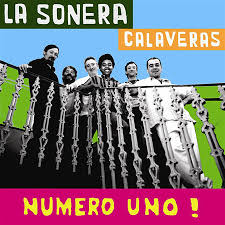 La Sonera Calaveras is a Scotland-based Cuban son group, featuring a number of very talented musicians led by Gerardo Ballesteros, who sings lead vocals, plays percussion and shares songwriting credits on the majority of Numero Uno!, their first album. Held together by rock-solid bassist Bob Thomson, who co-wrote many of the songs with Ballesteros, the La Soneras sound is authentically Cuban, alternating between delicately fingered guitar lines and melancholy horn playing on one side, and exuberant rave-ups on the other, sometimes shifting between the two moods in the same song. Fans of the genre will be pleased by the straightforward and unpretentious production values on the album, which spares us any attempts at fusion or electronic experimentation in favour of a classic and sincere expression of (mostly) pure son.
La Sonera Calaveras is a Scotland-based Cuban son group, featuring a number of very talented musicians led by Gerardo Ballesteros, who sings lead vocals, plays percussion and shares songwriting credits on the majority of Numero Uno!, their first album. Held together by rock-solid bassist Bob Thomson, who co-wrote many of the songs with Ballesteros, the La Soneras sound is authentically Cuban, alternating between delicately fingered guitar lines and melancholy horn playing on one side, and exuberant rave-ups on the other, sometimes shifting between the two moods in the same song. Fans of the genre will be pleased by the straightforward and unpretentious production values on the album, which spares us any attempts at fusion or electronic experimentation in favour of a classic and sincere expression of (mostly) pure son.
Numero Uno! opens in grand style with the upbeat “Muevela,” where Ballesteros is supported in vocal duties by Tina Clarke to favourable effect. In fact, the strongest songs on the album take advantage of the possibilities provided by the blend and contrast of male and female voices, or solo voice and chorus, as in the album’s best tracks, “Se va la Marea” and “Mi Voy Pal Baile.”
The band’s versatility is evidenced in the album’s second cut, “Rumba del Pueblo,” where impressive percussion and horn-playing maintain a smoldering yet oddly subdued intensity for the first half of the song. “I am made of fire!” sings Ballesteros, as the song builds to an explosive climax.
Standout track “Se va la Marea” features some terrific guitar playing and a languid sensuality, again achieved in no small part through Tina Clarke’s enchanting backing vocals. The song’s impassioned vocal performances combine with guitar and horn patterns to create a soundscape of lush tropical imagery — “And if they ask of me, tell them, towards the sea I have gone.”
The romantic “Que Seria” features a fine vocal performance by Ballesteros, and some subtle bass playing by Bob Thomson. It is one of the few songs where Thomson’s essential contribution to the band’s sound comes to the fore, creating the ideal atmosphere for the improvisations of the other musicians and vocalists while providing the glue that holds the song together.
“Mi Voy Pal Baile” is another outstanding track, described in the liner notes as “Afro Spice with a hint of a Jig.” It features at its outset a laconic vocal performance by Ballesteros, which stands in contrast to the sunny atmosphere conveyed by the music, but reflects the lyrical sentiment: “I just left the hospital, diagnosed terminally poor. / I don’t have the strength to suffer so I’ll look for my friend / and we’ll party till the sunrise.” By mid-song, the melancholy is replaced with the exuberance of the party, again ably expressed by the sparring vocals between Ballesteros and Clarke. The song builds through a range of increasingly intense call-and-response sequences between Ballesteros and the backing vocalists, then Ballesteros and the horn section, before abruptly shifting tempo to a contapuntal climax, held together once again by Bob Thomson’s solid bass playing.
The melancholic “Lagrimas Negras” provides another highlight, introduced by Robert Henderson’s always capable trumpet playing. Even in their darker moments, though, Los Soneras sound like they are threatening at any moment to erupt into full-on party music. This track again features Ballesteros and Clarke sharing vocal duties, and some fine percussion.
Numero Uno! provides some outstanding music with a wide range of emotional shifts, generally moving from sadness or world-weariness to an intoxicated delirium that has the power to take the listener on the trip with them. While they lack the great seriousness of the classic son recordings — perhaps a result of not living in the poverty of Batista’s or Castro’s Cuba — there is a freshness, sincerity and sensuality to their songs that makes it ideal for parties or for listening to on those occasions when you feel the need to be transported to a sunnier place.
(Greentrax Records, 2003)
